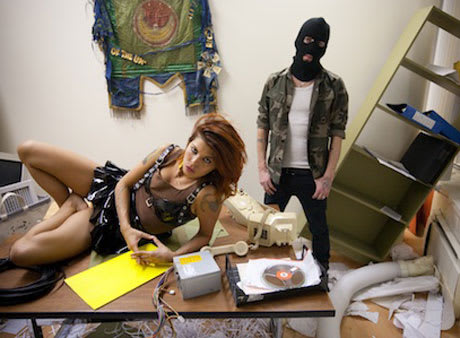"I think my own sad feelings are absent from this record," says Dan Boeckner, one half of electro-rock duo Handsome Furs, about their new record, Sound Kapital. "It's more about what we saw, people we worked with and this feeling of hope and connection to a global community." In late 2010, Boeckner spent nearly a month touring China and Southeast Asia with his Furs compatriot (and wife) Alexei Perry. The tour was filmed and documented for CNN and Vice, but it was the experience itself that left a lasting impression on the Montreal pair. Perry explains: "I feel like a lot of the things we witnessed made it into the songs we recorded, both sonically and lyrically. We were discussing things that we saw that were terrifying, or depressing, or beautiful, and we wanted to recreate those things both with what we said in the songs and in the way they sounded."
Sound Kapital is faster, heavier and more electronic than any Handsome Furs record to date. That's partly due to the influence of being in Southeast Asia ― "everything was very cacophonous and whizzing and whirring, and we wanted to recreate that speed and immediacy," Perry explains ― but it can also be attributed to the practicality of recording on tour, which the Furs did largely on keyboards. They wrote "in the hotel room, in the van, at the venues," continues Perry, and fleshed out songs during sound checks. Plus, argues Boeckner, they wanted to make a more electronic record ― "You can't write dance music on guitar," he asserts.
But the album is hardly just about dancing. It's a summary of the years touring the world that the Handsome Furs spent after their 2009 sophomore record, Face Control, and the inspiration they found there, of what music can mean in the face of adversity. "A lot of the people we were interacting with in Southeast Asia and China were these kids making really, really honest music in less than ideal circumstances," says Boeckner, "and they were very hopeful about what they were doing, and very committed and positive. Their friends had been jailed for playing music, but they were very positive."
Asked whether they believe music has a role beyond entertainment, as part of a cure for global social ills, the Furs are positively adamant that it's, as Perry contends, "A power you have as a person, to make the world slightly more liveable." Boeckner agrees: "If a band can give the crowd this momentary feeling of hopefulness, or kinship, or express pain that the audience is feeling, even if it's just for a 45-minute set, I think that's a positive emotional and political act. Positivity is like an act of resistance, in a way, and I like that idea." Boeckner's done enough touring, he insists, to realize "that a lot of people are making music with less than ideal equipment. If you live in Belgrade, you're not going to be able to buy the Roland SP-404 sampler unless you fly to Austria and pay a mint for it. Now is the time that people should be lauded for making music on the cheap. You don't need to spend a lot of money, you don't need to hire an orchestra, all you need to do is play good music with what you have and project that to the audience. I really strongly believe in that."
Sound Kapital is faster, heavier and more electronic than any Handsome Furs record to date. That's partly due to the influence of being in Southeast Asia ― "everything was very cacophonous and whizzing and whirring, and we wanted to recreate that speed and immediacy," Perry explains ― but it can also be attributed to the practicality of recording on tour, which the Furs did largely on keyboards. They wrote "in the hotel room, in the van, at the venues," continues Perry, and fleshed out songs during sound checks. Plus, argues Boeckner, they wanted to make a more electronic record ― "You can't write dance music on guitar," he asserts.
But the album is hardly just about dancing. It's a summary of the years touring the world that the Handsome Furs spent after their 2009 sophomore record, Face Control, and the inspiration they found there, of what music can mean in the face of adversity. "A lot of the people we were interacting with in Southeast Asia and China were these kids making really, really honest music in less than ideal circumstances," says Boeckner, "and they were very hopeful about what they were doing, and very committed and positive. Their friends had been jailed for playing music, but they were very positive."
Asked whether they believe music has a role beyond entertainment, as part of a cure for global social ills, the Furs are positively adamant that it's, as Perry contends, "A power you have as a person, to make the world slightly more liveable." Boeckner agrees: "If a band can give the crowd this momentary feeling of hopefulness, or kinship, or express pain that the audience is feeling, even if it's just for a 45-minute set, I think that's a positive emotional and political act. Positivity is like an act of resistance, in a way, and I like that idea." Boeckner's done enough touring, he insists, to realize "that a lot of people are making music with less than ideal equipment. If you live in Belgrade, you're not going to be able to buy the Roland SP-404 sampler unless you fly to Austria and pay a mint for it. Now is the time that people should be lauded for making music on the cheap. You don't need to spend a lot of money, you don't need to hire an orchestra, all you need to do is play good music with what you have and project that to the audience. I really strongly believe in that."
